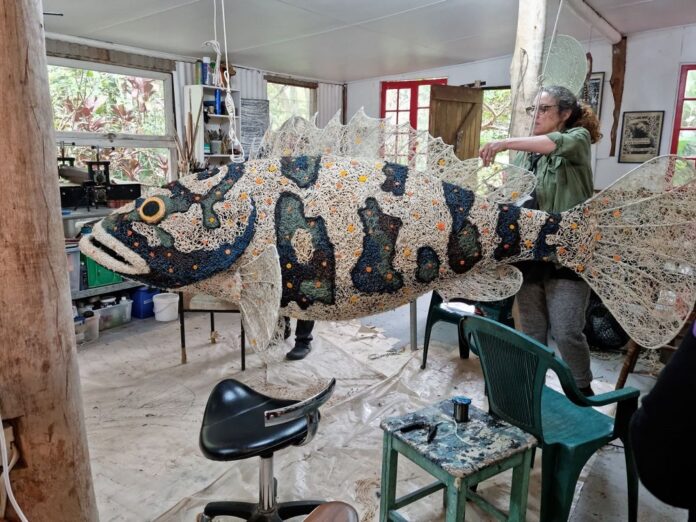DUBAI: One of Expo 2020’s many missions is to raise awareness about the beauty of our planet and how human beings can preserve what we have left of our natural environment — before it is too late.
Located in the Opportunity District across from China’s Pavilion and facing Sunrise Plaza, a large artwork titled Hammour House, by Australian artist Sue Ryan, prompts any passerby to stop and marvel at the work’s incorporation of intricately layered fishnets that were previously discarded in the ocean, as well as other debris from the sea.
Hammour House, by Australian artist Sue Ryan, incorporates intricately layered fishnets that were previously discarded in the ocean. Supplied
The sculpture is one of three art installations that make up the community art project called Hammour House. The other two works include a vibrant tapestry by UAE-based schoolchildren made using batik technique and sustainable dyes created by Dubai-based muralist Steve Chambers, and an ever-expanding coral reef sculpture that will come into fruition over the course of Expo 2020’s six-month existence through artistic contributions of visitors who attend various art and teacher-led workshops staged by Hammour House.
The curated community art project brings together fishermen, scientists, artists and various institutions to champion better care for local marine life. Its aim is to raise awareness for hammour and grouper fish — among the overfished species in the UAE that are now endangered. Coral reefs are the main habitat for endangered fish indigenous to the UAE and due to the destruction of the marine ecosystem, they too are now under threat of extinction.
The sculpture is one of three art installations that make up the community art project called Hammour House. Supplied
The project draws its curatorial inspiration from the 1001 Nights story of Abdullah the Fisherman and Abdullah the Merman. As the story goes, a poor fisherman named Abdullah, who had a large family, was suddenly unable to catch any fish. After he was encouraged by his wife, he cast his net again and this time pulled out a merman who was also called Abdullah. The two became partners and suddenly there were abundant fish stocks for the local fishermen. The moral of the story, as the Expo 2020 community art project emphasizes, is that creatures of the land — humans — must work with creatures of the sea, fish and coral reef to ensure a sustainable environment for all.
Hammour House is located in the Opportunity District across from China’s Pavilion and facing Sunrise Plaza. Supplied
“Hammour House examines the historic relationship between Emiratis and the sea in a number of ways,” Ahmed Al-Enezi, senior manager for arts and culture at Expo 2020, told Arab News, recalling one of the first research trips conducted for the project with a visit to Delma Island, an Emirati island in the Persian Gulf, to meet with local fishermen.
“During this trip we became inspired by the fascinating stories the elders had to tell us,” he said. “There were tales of Goliath-sized hammour fish that once existed in our waters, with some big enough to devour an entire human!”
The project draws its curatorial inspiration from the 1001 Nights story of Abdullah the Fisherman and Abdullah the Merman. Supplied
Al-Enezi added that the fishermen spoke of their love of their work and the importance of preserving their practice in the future, even though they do not rely anymore on traditional fishing for sustenance. The UAE is also investing great efforts into protecting the country’s fish stocks by empowering fishermen to become custodians of the environment.
“Our fishermen community is not a relic of the past, and not just a segment of the community to be showcased. We have a lot to learn from their intimate relationship with nature, and their proactive role in protecting both our heritage and our environment,” said Al-Enezi.
Hammour House emphasizes the importance of collaboration in realizing a sustainable and just environment. Supplied
Hammour House emphasizes the importance of collaboration in realizing a sustainable and just environment. Al-Enzi said: “Communities may seem segmented, and some subgroups seem to have no relationship with others, but art has the power to connect everyone.”

